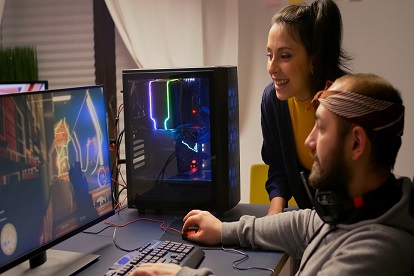
A great game isn’t luck—it’s purposeful design and relentless testing. We make sure every moment feels legendary.
From first concept to final build, we architect play experiences that feel intuitive, rewarding, and endlessly replayable.
Every feature is designed to align with a central vision, ensuring each element contributes to a cohesive and emotionally engaging journey for the player.
Ideas are quickly turned into playable prototypes, tested, and refined through continuous iterations based on real-world data.
A finely tuned core gameplay loop and meta-game structure that keeps players engaged and returning with new challenges and rewards.
Onboarding systems that teach new players without overwhelming them, introducing mechanics in a way that feels natural and intuitive.
Balancing difficulty with adaptive AI ensures every player experiences the perfect amount of challenge, keeping them engaged and invested.
Careful design of in-game economy, progression systems, and monetization to ensure a fair and enjoyable experience for all players.
Designing with color-blind palettes, sensory-friendly cues, and customizable controls to ensure that all players can enjoy the experience.
Utilizing heat-maps, funnel analytics, and A/B testing to continually optimize the gameplay experience based on real-world data.
Maintaining a unified creative vision through collaboration across art, audio, engineering, and QA departments to create seamless experiences.
Providing clear and concise documentation, including GDDs, flowcharts, and state machines, to ensure smooth collaboration and alignment among teams.
Systems thinking · Vision pillars · Level and narrative design · Player psychology
Grey-boxing, balance passes, live-ops tuning, post-mortems
Wireframing · Interaction flows · Accessibility standards
Test-plan writing · Bug lifecycle · Test-case management
Mobile — device matrices, touch-input, sensor tests
PC — hardware variability, graphics settings, mod paths
Console — TRCs/LotCheck, save-data, controller schemes
Smoke, sanity, regression, multiplayer, network, and first-party compliance
Profiling, memory, frame-rate, thermal and battery checks
Scripting test harnesses, CI/CD pipelines, telemetry dashboards
Case-study write-ups, playable prototypes, test-report showcases
QA transforms a good idea into a reliable, platform-ready product by finding issues before players do and proving the fix.
Comprehensive test planning and risk assessment for gameplay, systems, and live-ops drops
Smoke, sanity, regression, and exploratory passes on every build
Across mobile matrices, PC configs, ultrawide, multi-GPU, and controller permutations
TRC/XR, LotCheck, Apple CTS, Google Play, Steamworks, age-rating boards
Latency simulation, matchmaking, session recovery, server load testing
FPS, frametime, memory leaks, thermal issues, CPU/GPU stress
Packet tampering, save-file exploits, leaderboard integrity, entitlements
Text expansion, right-to-left, cultural-sensitivity, audio syncing
Screen-reader flows, subtitle timing, remapping, flashing-light testing
Scripted smoke tests, build sanity bots, crash telemetry dashboards
Patch validation, log monitoring, rollback procedures, support escalation
Reproducing issues, writing repro steps, verifying hotfixes
 Game Design Fundamentals
Game Design Fundamentals
 Hands-on Training
Hands-on Training
 Case Studies
Case Studies
 Player Psychology & Engagement
Player Psychology & Engagement
 Portfolio Development
Portfolio Development
 UI/UX Design
UI/UX Design
 Ethical Considerations
Ethical Considerations
Game designers have diverse career opportunities, including roles such as level designer, narrative designer, systems designer, and lead game designer
Level designers can pursue career opportunities in game development studios, working on creating engaging and immersive game levels for various genres
Game QA testers have career opportunities in game development studios, focusing on identifying and reporting bugs to ensure high-quality gaming experiences
UI/UX designers have career opportunities in various industries, creating user-friendly interfaces and enhancing user experiences for digital products
Game producers have career opportunities in game development studios, overseeing project management, team coordination, and ensuring the successful delivery of games
Ans : You’ll gain hands-on experience with Unity and Construct 3, industry-leading game development tools.
Ans : No prior coding knowledge is required. The course focuses on game design principles, though coding basics may be introduced.
Ans : 100% guaranteed placement to help you land your dream role.
Ans :We focus on practical learning, real-world projects, ethical design considerations, and case studies of both successful and failed games.

The global gaming market is expected to surpass $300 billion by 2025.

Over 3 billion people worldwide actively play video games.

Mobile games generate nearly 50% of total gaming revenue.

The esports industry is projected to reach $2 billion by 2025, creating new job opportunities.

60% of game development time is spent on testing & bug fixing.

The demand for immersive gaming experiences is rapidly increasing.
Practical Exercises (25 Hours - Practice)
Final Live Project Submission (10 Hours - Practice)
Assessments (5 Hours - Learning)
|
Weeks |
Topic |
Total Hours |
Teaching (T) |
Learning (L) |
Practice (P) |
|
Week 1-2 |
Introduction to Game Testing |
50 Hours |
20 Hours |
10 Hours |
20 Hours |
|
Week 3-4 |
Core Game Testing Concepts |
50 Hours |
20 Hours |
10 Hours |
20 Hours |
|
Week 5-6 |
Deep Dive into Testing Techniques |
50 Hours |
18 Hours |
12 Hours |
20 Hours |
|
Week 7-8 |
Advanced Testing & Agile Methodologies |
50 Hours |
18 Hours |
12 Hours |
20 Hours |
|
Week 9-10 |
Specialization & Industry Trends |
50 Hours |
15 Hours |
15 Hours |
20 Hours |
|
Week 11-12 |
Capstone Project & Career Guidance |
50 Hours |
10 Hours |
15 Hours |
25 Hours |
DPUSKill offer cutting-edge professional certificates designed to enhance your skills and open doors to new career opportunities. Our programs are tailored to meet the demands of today’s competitive job market, ensuring that you gain practical knowledge and expertise that employers value.







Over a decade of Experience in Games Quality Assurance and Production | 10+ years Entrepreneurship | Several successful Strategic Partnerships for the company | Knows Building Business | Sales | Entrepreneur...
View More
Druhin Mukherjee is currently the Co-founder and Development Director at GodSpeed Games. He was the first Indian to win a video games BAFTA in the year 2012...
view more